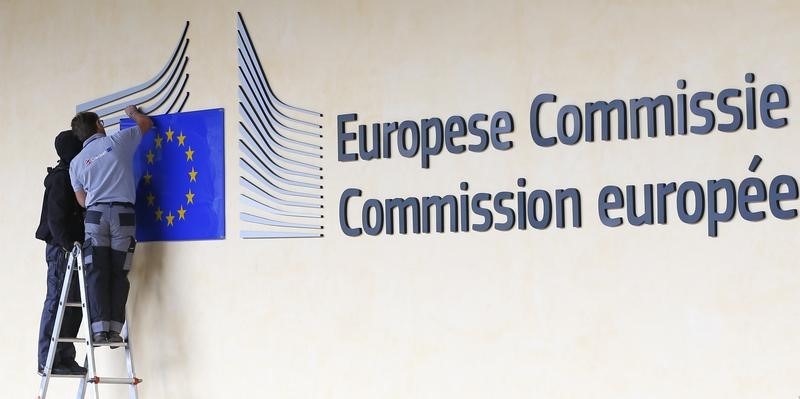By Francesco Guarascio and Robin Emmott
BRUSSELS (Reuters) - European fears of being forced to lower tariff defences against cheap Chinese imports have grown following a confidential warning from the EU's own lawyers, who say the bloc should not ignore changes to global trade rules set to favour Beijing.
In a draft letter seen by Reuters, the head of the European Commission's Legal Service, Luis Romero Requena, warned the head of the trade directorate that the EU would not have a good case to disregard the effects of the World Trade Organization viewing China as a more market-based economy -- a status that will make it harder for other powers to justify current high tariffs.
In asking its lawyers to help it decide, the EU executive has shown how it is caught in a dilemma between shielding local industry and jobs and seizing a chance to win friends in Beijing and gain an edge over U.S. rivals as China opens up its markets.
A spokesman for EU Trade Commissioner Cecilia Malmstrom declined comment on the letter but stressed that legal opinions would only form one part of a broader reflection currently under way on the implications of expiring WTO limitations on China's right to claim equal treatment with its free-market competitors.
European manufacturers say the future of EU industry depends on preventing China from flooding markets with illegally cheap goods, but rules allowing the EU to protect itself with some ease expire next year and Europe is divided over how to act.
The WTO recognised when Communist-ruled China joined the free trade body in 2001 that its local prices are not set by market forces. WTO members can normally apply punitive "anti-dumping" tariffs on others only if export prices are below those in the exporter's home market. But with China, the EU and others have been able to ignore low domestic prices and set tariffs to make Chinese exports as expensive as in wealthier countries.
However, those WTO limitations on China appear to expire on Dec. 11, 2016 -- though there is some room for interpretation.
Trade experts expect the United States to take the view that U.S. law makes no requirement for the government to change its treatment of China. Washington has not made its position public.
Europe must take a decision soon because the legislative changes it will entail must be approved by the European Parliament and translated into the bloc's 23 official languages.
In the internal draft document seen by Reuters, EU lawyers recommended recognising the expiration of the current rules, warning that "arguments to the contrary are not well-founded".
In its five-page, line-by-line scrutiny of China's WTO accession agreement, the EU Legal Service lawyers conclude it is "a high-risk approach" to try to argue that Beijing should still be treated differently from other major trading partners.
Trade Commissioner Malmstrom's spokesman told Reuters: "The Commission is currently looking at the legal implications of the expiration of certain provisions of the protocol of accession of China to the WTO relating to the treatment applied to China in trade defence investigations. This will take some time."
China is certain to launch a case at the WTO if the European Union chooses to maintain the status quo and can exert pressure in other ways by restricting EU access to its markets or by retaliating.
Just last month, the EU slapped anti-dumping duties of up to 25.2 percent on some Chinese steel, using prices in the U.S. domestic market as a reference. The process is complex, but if the WTO modifies its view of how free China's market is, tariffs might have to take more account of Chinese domestic prices.
"PLAYING FOR TIME"
Not everybody in Europe agrees with the EU lawyers' view, as China's accession treaty to the WTO is written in a way that allows for different interpretations.
A group of more than 20 European industries, from footwear to solar panels, wrote to Malmstrom on March 4 warning that changes to the rules on China would see the "survival of many European companies...seriously threatened, with severe adverse consequences for European jobs".
They argue that China can get better treatment only if it is recognised as a market economy -- meaning decisions are made based on supply and demand, not the state -- but that remains a long way off, EU and U.S. officials have repeatedly said.
"Some in Commission are trying to play for time, some in the Commission are trying to be too clever and think that the longer they postpone a decision, the more they can squeeze China," said Fredrik Erixon, the director of the Brussels-based European Centre for International Political Economy.
There is a lot at stake and not just for Beijing. The European Union has more than doubled trade with China since 2003, making it its second largest trading partner after the United States. Europe is China's most important trading partner.
Last month, Britain, Germany, France, Italy and other states joined a nascent, Chinese-led Asian Infrastructure Investment Bank (AIIB) in defiance of Washington's misgivings, as China seeks a greater role in shaping global economic governance.
Beijing and Brussels are also negotiating an investment treaty to give the EU greater access in China, from banking to telecoms, and to push Beijing to drop onerous requirements that Europeans must hand over sensitive know-how to expand there.
China eventually wants a free-trade deal.
But in the short term, there is friction as China seeks to produce the kind of sophisticated products that compete directly with Europe and the changes would be huge for European industry.
